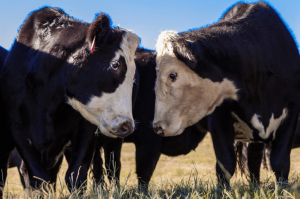Clemson Extension Cattlemen’s Boot Camp teaches systems approach to raising cattle
April 5, 2016Gaven and April Hammett want to expand their cattle operation and are looking to Clemson University for the information they need.
“This is our first time attending (the Boot Camp),” Gaven Hammett said. “Our future plans are to sell beef right off our farm. Attending events such as this is a great way for us to learn what we need to do in order to be successful.”The Hammetts, who own Hi-Son’s Farm in Salem, attended the 2016 Cattlemen’s Boot Camp, held at the T. Ed. Garrison Arena Cattle Complex on March 24. They raise cattle and chickens and wanted to learn how to market their beef.
Joe Davis, owner of J. Davis Cattle in Westminster, said being proactive is a major step toward being successful in the cattle businesses. Davis spoke about how the Clemson Extension Service has helped him create a successful business.
“Clemson Extension (agents) have always been available to help me whenever I’ve called with questions,” Davis said. “They’ve provided me with a lot of valuable information that has helped my business grow. Proper planning is a main lesson I’ve learned from them. I’ve learned you can plan, or you can just let something happen and deal with it. I prefer to plan.”
Helping producers learn how to plan so that they can profit was the idea behind this year’s Boot Camp.
“Utilizing a systems approach to successful beef cattle production was the overall theme for this year’s Cattlemen’s Boot Camp,” said Matthew Burns, a Clemson Extension animal scientist. ”Under a systems approach, everything on a farm works together to determine profit.”
Professors from Clemson University and the University of Georgia teamed up with industry representatives and producers to bring Boot Camp participants information on beef cattle economics, nutritional management, improving reproduction performance, communicating a positive image of the beef industry and understanding the generational views of the beef business. Accurate record-keeping was stressed by all of the presenters.
“The whole point of record-keeping is to improve your herd,” said Lawton Steward of the University of Georgia. “Cattle producers need to keep records for animal identification, they need to keep detailed calving records and they need to keep detailed treatment records. Accurate records are essential for improving herds so that producers can get the highest price for their beef.”
Before producers can get the highest price for their beef, they need to know the “4 Ps of Marketing,” which are “product, price, place and promotion,” said Nathan Smith, a professor and economist with the Clemson University Cooperative Extension Service.
“The first thing you should do as a cattle producer is determine your goals,” Smith said. “You should determine if your goal is to make a profit or improve their bottom line. Good goals are measurable and achievable. Take a look at everything — markets, inventory, everything — when deciding what you want to achieve.”
Boot Camp participants also learned that Millennials, people born between 1982 and the early 2000s, are the fastest-growing sector of the consumer base. With Millennials comes the belief that “locally grown” is better and opinions are influenced by technology-based formats such as social networks.
“Consumers’ mindsets have changed,” said Jacob Segers, an assistant professor with the University of Georgia. “Before you can sell your beef, you should be open to consumers’ concerns. Understand how traditional agriculture and modern marketing combine. Stay on top of hot button issues so that you will know what’s going on in today’s markets.”
This was just the second year for the Cattlemen’s Boot Camp, but Clemson leaders hope it continues.
“We need activities such as this to help the cattle industry grow in South Carolina,” said Thomas Dobbins, director of the Clemson University Cooperative Extension Service. “We want to have an industry that is attractive to young people and events such as this can help us do just that.”
During his discussion with participants, Dobbins said the future of the state’s cattle industry, as well as other agricultural enterprises, depends on the state’s water supply. Dobbins said a strong focus will be placed on water in South Carolina in the near future.
“Our ability to manage water is going to be important to the agricultural industry in South Carolina,” Dobbins said.
Youth who attended this year’s Boot Camp participated in activities designed to teach youth more about the cattle industry.Meghan McPhail Wood, assistant director of the Clemson 4-H program and livestock coordinator, organized the youth educational component.
“The purpose for having a youth educational component to the Cattleman’s Boot Camp was to provide the youth with not only opportunity to learn real-world skills in the beef industry, but also provide them with exposure to our state’s beef producers, allowing them to build relationships and a network for future growth and opportunity,” Wood said. “We are growing the 4-H youth livestock program and it is our goal to provide them, as well as beef cattle producers in the state, with high-quality, real-world applicable learning opportunities such as Cattleman’s Boot Camp in the future.
In addition to the presentations and youth component, the Boot Camp also included breakout sessions, which covered topics such as: Women in Agriculture, Youth Livestock Judging, Handling Dystocia and more. This was the second year for the Boot Camp. Burns said plans are to continue to hold the Camp every year.














